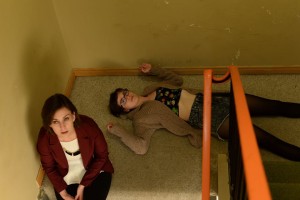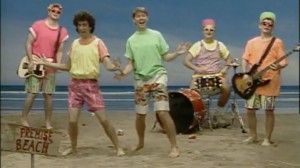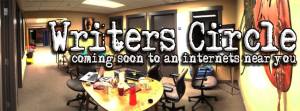You know the drill. Here’s the episode…
…now let’s get to it.
Hark now to the tale of how I, as head writer, made everything complicated for the production team forever and always.
“Forever and always” in this case being defined as for a few more weeks, but still.
So the episodes did not get written in anything even approximating production or airing order. One of our first priorities when we kicked off the project was to plan out the entire season, figure out what stories we needed, what stories we wanted, try to give all the characters decent coverage, plot a couple of long-term arcs. We then divvied up the writing between me and Keith, with my plan being to write the season finale last so that it could properly pay off everything we’d done.
And then having done all of that, I suddenly decided “Wouldn’t it be neat if we did an episode about how everyone became writers in the first place?” And despite the fact that we had a full season, decided to just go ahead and write it anyway, because I’m the head writer and give zero fucks, apparently.
Fortunately, it turned out pretty funny, and a planned two-parter read way faster than we expected, so it all worked out. It just… it created a little problem.
See, by then, every other script was written. Written and numbered, from one to thirteen. And since renumbering 10 shared files felt like a lot of work, I just went ahead and numbered Origin Stories episode 3.5.
So it’s episode four to the audience, and 3.5 to the production team. Which, you know, is just a bundle of laughs when the production team is chatting.
Fortunately, we’ve worked out a good solution all around. We just keep referring to episodes by their script number (which will soon enough bring us to episode 6/7), and since I handle the YouTube copy and the social media posts, only I have to worry about their broadcast numbers.
Which, you know, is basically just counting.
Episode observations
I don’t have too many set memories on this episode. It fell during one of the days in Super Fun Happy Good Times Week when I had rehearsal for Frost/Nixon, so it was 10:00 by the time I was on set. But there are a few random notes and Easter eggs I can share.
There are those who imply that Phil, the playwright, might have some passing resemblance to Dan, the me. This is, of course, nonsense and slander, and officially I have no knowledge how this rumour got started. But those who spread it tend to point at the supposed fact that I gave Phil three of my old jobs.
Which is, of course, madness. Sure, okay, regular readers or those willing to troll the archive will know all about my brief time at Canada Post and some snippets of my time as a projectionist, but I only trained as a blackjack dealer. Never actually worked as one. So there.
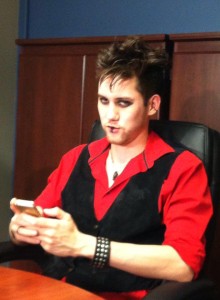
Moving along… due to the wonders of the filming process, Phil and Becky’s halves of their phone call were actually shot around two months apart. July was our “no Stephanie/Becky month,” meaning no Becky scenes, which was tricky, because there’s only one episode in the whole season that Becky’s not in. So in July, we knocked off just as many non-Becky moments as we could, including Phil’s side of the phone call.
Although it occurred to us in the moment that it would have been better to have both of them in the room… could have opened up some neat split-screen opportunities… but we’ll just call that a lesson for next season.
Now, while the halves of the phone call are separated by time, they were actually shot only 20ish feet apart. See, we didn’t have a lot of budget for locations… or anything… so with the exception of the writers’ room, we mostly hunted down what we could get for free. Like, say, my house. Which quite fortunately has two very distinct floors. Phil lives in my basement, and Becky on my main floor, although we mostly only see the kitchen. And yes, that’s my pimp chalice she’s drinking out of.
Speaking of my stuff… it was really simple turning my basement into Phil’s nerdy living room. It is probably not surprising that I own a fair amount of nerd paraphernalia. It was simply a matter of scouring the upper floor for Dr. Who merch, webcomic geek art, and the statue collection I call my nerd reliquary.
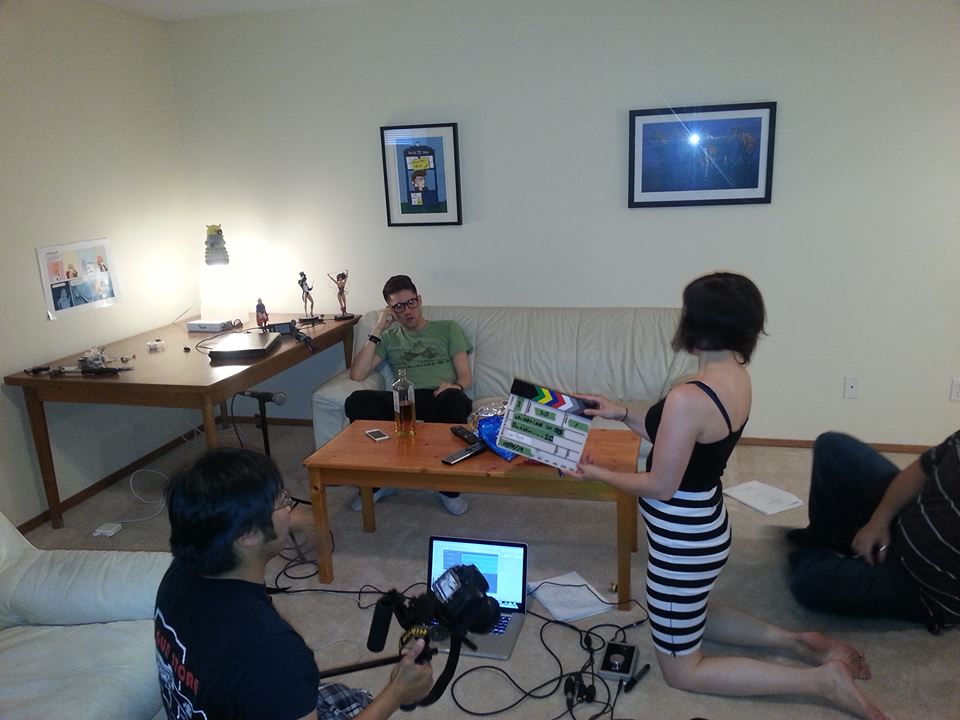
Most of which you can’t even see. We’d even gotten permission from Joel Watson of Hijinks Ensue to use his “Doctor is In” print, in exchange for reminding people that you can totally buy your own at his store, and it didn’t even make it into the shot. Redecorated the entire basement for nothing. Except that the table totally works better there.
Blast from the past
Shifting to the flashback to movie night at casa del Winnick… we needed audio for whatever awful movie spurred Jeff to launch his moviemaking career. But even if there was a movie we could think of that no sane mind would ever consider to be less than fully terrible…
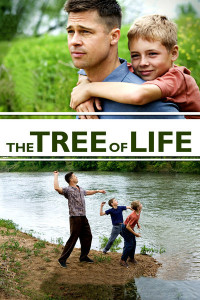
… if it wasn’t something we owned, we couldn’t use it. So as a placeholder, our sound engineer, Patrick “DJ Peens” Murray, used the dialogue between Zoe and Tina from the start of episode three, because it amused him to have Jeff complaining about how bad the dialogue was in something I wrote. And it’s not that the rest of the team didn’t see his point, just that if we used dialogue from last week’s episode, we thought people might notice.
So we found another way, a way that makes this scene even more self-referential.
Jeff, Becky, and Phil of Writers’ Circle: the Series are watching the DVD of Writers’ Circle: the Play.
In a perfect world, we would have used one of Jeff’s scenes, so that Jeff was complaining about having to watch the Jeff Winnick Story, but I got Peens the DVD late and didn’t have time to find a good scene. So we just grabbed scene two (which I thought was a Jeff Winnick scene, having forgotten we cut that one for time), aka. the first scene not reproduced nearly word for word in our first episode.
Insignificant tribute
The… well-fed missionaries that Becky chases off in her flashbacks are, as the credits reveal, myself and Keith, with Ian completing the “executive producer cameo” set elsewhere in her flashback. We are not holding bibles or books of Mormon, as I don’t really have either, but are instead each holding one of Terry Pratchett’s Discworld books. Some of the only and easiest to find hardcover books I own.
Because man I love Terry Pratchett’s Discworld series.
It began as a simple fantasy parody novel, but grew into something much, much more. The Discworld is a fully-realised fantasy world that acts as a mirror of our own through twisting and subverting storytelling tropes. It’s filled with incredible, lovable characters I could never wait to read more about: angry detective Samuel Vimes and the rest of the Ankh-Morpork City Watch; conman turned unwilling civil servant Moist Von Lipwig; Granny Weatherwax and the Witches of Lancre; the bumbling wizards of Unseen University; Death and his adopted family. Forty novels, each designed to delight new and old readers alike. Terry Pratchett was a uniquely gifted writer, comedian, satirist, storyteller, and world builder. Since I first read Good Omens twenty-ish years ago, an end-of-the-world tale he wrote with Neil Gaiman, Terry Pratchett’s books have been an endless source of joy for me.
He died yesterday at the age of 66. Early-onset Alzheimer’s. The world… my world… is lessened by his absence.
Next week… Phil goes solo in Deconstructing Phil. Be well, everybody.


